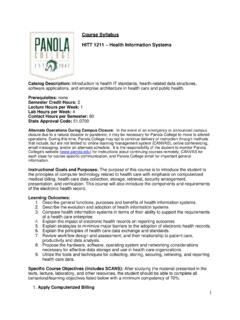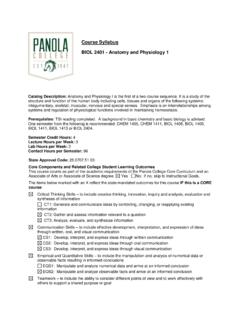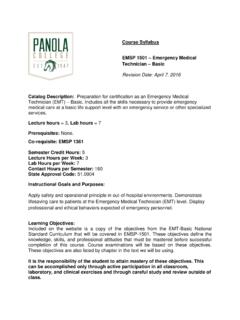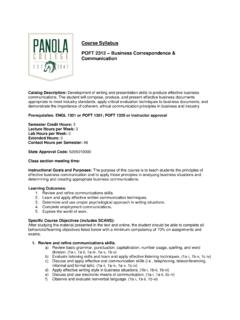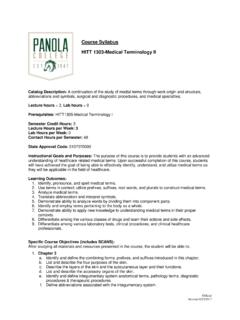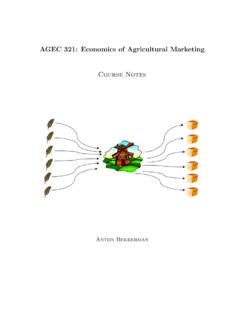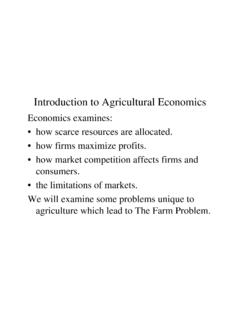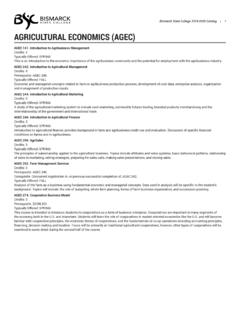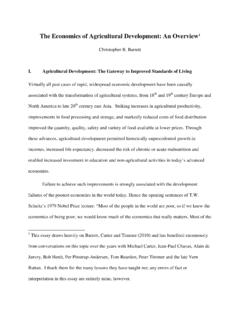Transcription of Course Syllabus Agricultural Economics - Panola College
1 Course Syllabus AGRI 2317 introduction to Agricultural Economics Revision Date: 9/5/2013 Catalog Description: Fundamental economic principles and their applications to the problems of the industry of agriculture. Lecture hours = 3, Lab hours = 0 Prerequisites: None Semester Credit Hours: 3 Lecture Hours per Week: 3 Lab Hours per Week: 0 Contact Hours per Semester: 48 State Approval Code: 01 Core Components and Related College Student Learning Outcomes This Course counts as part of the academic requirements of the Panola College Core Curriculum and an Associate of Arts or Associate of Science degree. Yes No: If no, skip to Instructional Goals. The items below marked with an X reflect the state-mandated outcomes for this Course IF this is a CORE Course : Critical Thinking Skills to include creative thinking, innovation, inquiry and analysis, evaluation and syntheses of information CT1: Generate and communicate ideas by combining, changing, or reapplying existing information CT2: Gather and assess information relevant to a question CT3: Analyze, evaluate, and synthesize information Communication Skills to include effective development, interpretation, and expression of ideas through written, oral, and visual communication CS1: Develop, interpret, and express ideas through written communication CS2: Develop, interpret, and express ideas through oral communication CS3.
2 Develop, interpret, and express ideas through visual communication Empirical and Quantitative Skills to include the manipulation and analysis of numerical data or observable facts resulting in informed conclusions EQS1: Manipulate and analyze numerical data and arrive at an informed conclusion EQS2: Manipulate and analyze observable facts and arrive at an informed conclusion Teamwork to include the ability to consider different points of view and to work effectively with others to support a shared purpose or goal TW1: Integrate different viewpoints as a member of a team TW2: Work with others to support and accomplish a shared goal Personal Responsibility to include the ability to connect choices, actions, and consequences to ethical decision-making PR1: Evaluate choices and actions and relate consequences to decision-making Social Responsibility to include intercultural competence, knowledge of civic responsibility, and the ability to engage effectively in regional, national, and global communities SR1: Demonstrate intercultural competence SR2: Identify civic responsibility SR3: Engage in regional, national, and global communities Instructional Goals and Purposes: AGRI 2317 is an introduction to the field of Agricultural business and Economics .
3 The Course will stress the US and world food system with linkages among financial institutions, world markets, the macro economy, farms, agribusinesses, and the environment. Learning Outcomes: [from the ACGM catalog] After studying all materials and resources presented in this Course , the student will be able to: 1. Understand the structure of the Agricultural sector of the US economy. 2. Apply economic principles to understand the conduct and performance of the Agricultural industry. 3. Understand the market structure, in agriculture, that affects farm/ranch level and consumer level prices. 4. Understand the concepts of consumer choice and how it affects the farm/ranch level Agricultural firms. 5. Understand the macroeconomic aspects of the US economy as they affect the Agricultural sector 6. Understand the role and impact of government policy on the Agricultural sector 27.
4 Understand the importance of the global interactions that affect the Agricultural Course Content: Students in all sections of this Course will learn the following content: 1. Food Industry 2. Market Price Determination 3. The Firm as a Production Unit 4. Cost and Optimal Output Levels 5. Supply, Market Adjustments, and Input Demand 6. Imperfect Competition and Government Regulation 7. Consumer Behavior 8. Concept of Elasticity 9. Financial Intermediation and Markets 10. Monetary Policy 11. Fiscal Policy 12. Agricultural Policy Methods of Instruction/ Course Format/Delivery: AGRI 2317 is an online Course delivered by Canvas. It is designed to cover the entire semester and will be structured in a weekly format. During the semester, you will be given reading assignments, take online quizzes, submit homework, three (3) major exams, and a comprehensive final exam.
5 The major exams and the final exam will be administered by the Testing Center. Assessment: Several different assessment techniques will be used in AGRB 101 including: online quizzes and homework, three major exams and a comprehensive final exam. The quizzes and homework grade will be based on 100 points and will be determined by the percentage you earn. The exact number of points has not been determined. For example, if there are 500 total points of quizzes and homework and you have 450 total points, you average is 90% which will be your grade on quizzes and homework. Exams: Exams will consist of problem solving exercises and book content in a multiple choice format and problem solving. There may be some short answer essay questions on exams. Homework problems will be assigned throughout the semester and there will be online quizzes on Canvas. Please note that late homework cannot be made up.
6 All maturity dates on Canvas quizzes are final; no quizzes will be re-opened for any 3reason. If you wait until the last minute, then you are taking the risk of computer failure or any other complication. Course Grade: Your final grade will be based on the following: >=90% = A >=80% = B >=70% = C >=60% = D <60% = F Online quizzes and Major Exams (3)..25% Final Exam: Texts, Materials, and Supplies: Reading assignments will be posted on Canvas. Agricultural Economics , by Drummond and Goodwin, Third Edition (Prentice Hall) required You will need a working knowledge of Microsoft Word, Excel, and PowerPoint. You will need to be able to create and read PDF files. You can create PDF files in Word or Excel. I will explain during the Course . Other: Very Important Notes: No late assignments will be accepted Online assignments will always have an expiration date, no exceptions and assignments cannot be completed after the expiration date.
7 You must contact me in advance if you have to miss a major exam. The final exam will always be at the assigned time Your grade can be affected by attendance MAKE-UP EXAMS. If you should miss a major exam for a valid reason ( doctor s excuse, approved University function, or other generally acceptable reasons), you will be allowed to take a make-up exam. To qualify for this, you must let me know well in advance (24 hours) why you will have to miss that exam (I will need valid documentation). I will not, unless extreme circumstances are presented (with documentation), allow a student to make any types of alternative arrangements after an exam has started. Also, formal documentation will need to be provided to me within 2 days of the absence. 4 3. I DO NOT ACCEPT LATE ONLINE QUIZZES AND HOMEWORK ASSIGNMENTS. All homework and online quizzes will be posted well in advance of the due date, thus late assignments will not be accepted.
8 4. I will post Study Guides, grades, assignments, announcements, and class materials on Canvas. All email correspondence will use your Panola College email account; no personal emails will be accepted. 5. The major exams and the final exam will be administered at one of the Panola College Testing Centers. You will need to schedule an appointment during the time period allotted for each exam. Further instructions for scheduling will be provided on the Canvas site. The link for the Panola testing centers is: For current texts and materials, use the following link to access bookstore listings: For testing services, use the following link: If any student in this class has special classroom or testing needs because of a physical learning or emotional condition, please contact the ADA Student Coordinator in Support Services located in the Administration Building or go to for more information.
9 Withdrawing from a Course is the student s responsibility. Students who do not attend class and who do not withdraw will receive the grade earned for the Course . Student Handbook, The Pathfinder: 5
